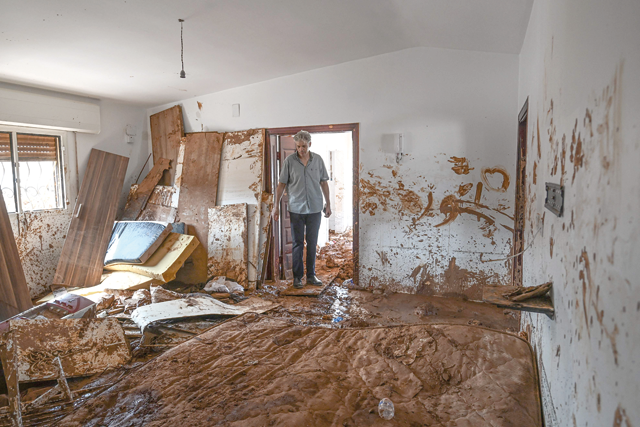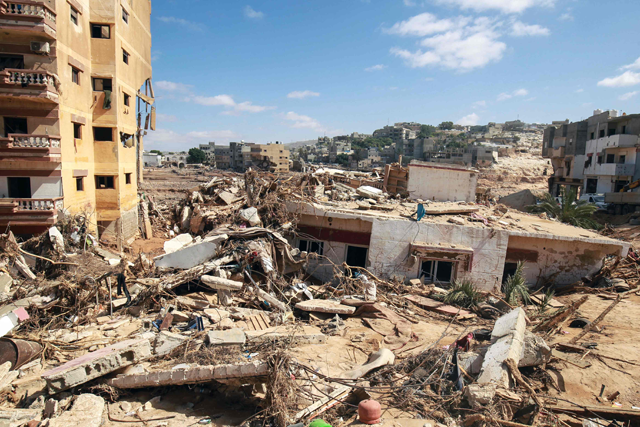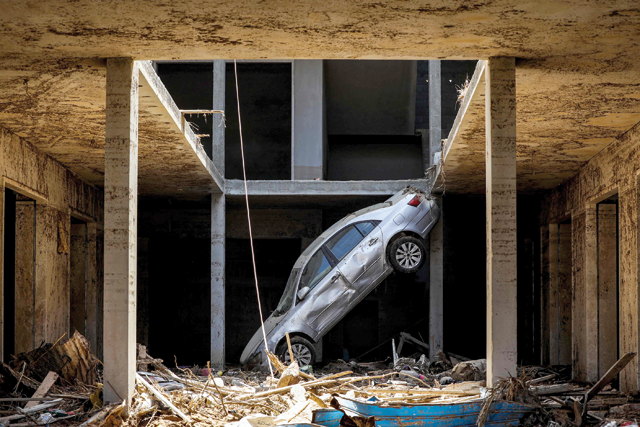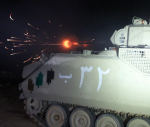You are here
Debris and dead bodies clutter flood-hit Libyan port
By AFP - Sep 23,2023 - Last updated at Sep 23,2023
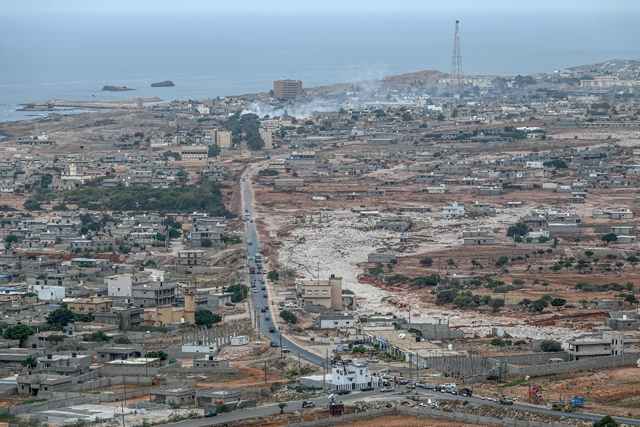
A general view shows Libya's eastern city of Soussa on Friday, days following deadly flash floods (AFP photo)
DERNA — Libya's devastating flood has transformed Derna from a busy port welcoming fishing boats and ships loaded with goods and passengers into a dump brimming with rubble, car wrecks and dead bodies.
Tugboat captain Ali Al Mismari, 60, recalled the night of September 10 when torrential rains caused by Storm Daniel battered the eastern Libyan city, bursting two dams and wiping out entire neighbourhoods.
At first, Mismari told AFP, he wanted to take his boat, the "Irasa", out of the harbour to avoid putting the crew at risk and to avoid damage to the vessel.
But in the chaos of the storm, with water levels rapidly rising, he was unable to see the seawalls surrounding the port and navigate a safe exit.
"There was nothing [to do] but pray," he said.
When day broke, the scale of the devastation became clear.
Mismari said he saw "massive trucks, car tyres, people, houses, entire palm trees... heaters, washing machines, refrigerators" had all been washed into the harbour by the flash flood.
The official death toll from the disaster stands at more than 3,300 — but the eventual count is expected to be far higher, with international aid groups giving estimates of up to 10,000 people missing.
'Zero visibility'
Since the tsunami-sized flood lashed Derna, port workers, fishermen and passers-by have largely abandoned the seafront, and only a handful of vessels, the Irasa included, were still there.
The tugboat was enlisted along with local and foreign teams to clear the bottom of the harbour.
The walkways surrounding the port are now paved with items retrieved by divers.
Captain Mohamed Chalibta, head of the port authority's crisis management committee, said the search was concentrated on "objects that had sunk in the port", including cars with people still thought to be inside.
An Emirati team, equipped with boats and jet skis, scoured one part of the harbour.
But the water was dark brown, filled with mud brought by the flood, and there was virtually "zero visibility", according to one of the divers.
The Emirati search mission chief, Col. Ali Abdullah Al Naqbi, was giving directions to his team, stressing the need to take full precautions.
Two by two, scuba divers secured with safety ropes descended from their yellow boat.
One emerged from the muddy water after a short while, and said: "We tied [a rope] to a car. We can't see anything."
Another diver meanwhile found a second car.
Back on their boat, other team members helped the divers remove foliage that had become stuck on them and sprinkled fresh water on their faces.
The Emirati team, in coordination with Libyan authorities, called in a crane that pulled one of the mangled wrecks out the water.
Survivor in fridge
As it was being removed, mud, water and what appeared to be human remains spilled out of the vehicle.
Lowered onto the dock, Libyan men in white coats, gloves and face masks took over to check the vehicle for bodies, but on this occasion they found none.
Officials expect the process of clearing the port to take a long time.
Rescuers are also searching the sea beyond the harbour, with maritime experts saying many bodies may have been carried eastward by the current.
Hafez Obeid, head of the Libyan forensic team, said the salinity of the water helps to preserve bodies, making the identification process easier than for corpses found on land.
Aboard the Irasa, captain Mismari said "private fishing boats were the first to rush to the rescue" on the night of the disaster.
Next to him, technician Taoufik Akrouch, 61, recalled that "the water level rose above the dock by about one-and-a-half metres".
The Irasa began tilting violently and the crew started its engines before cutting mooring lines.
At dawn, they heard a cry for help.
They found a survivor — a naked woman floating inside a refrigerator, according to two crew members.
They said she asked them: "Where is my sister?"
Another survivor rescued by Mismari's team, an Egyptian, could not say how he got to the harbour.
"He had been sleeping, and then found himself there," Mismari said. "Maybe he had been unconscious."
Related Articles
BENGHAZI, Libya — Libya's flood-devastated port city of Derna will host an international conference next month to aid reconstruction efforts
DERNA, Libya — Shipments of international aid began to arrive in Libya on Saturday, offering a lifeline to thousands despite dwindling hopes
DERNA, Libya — The UN warned Monday that disease outbreaks could bring "a second devastating crisis" to Libya a week after a huge flash floo


